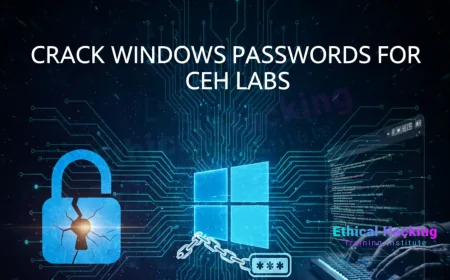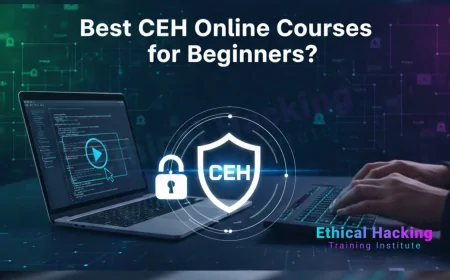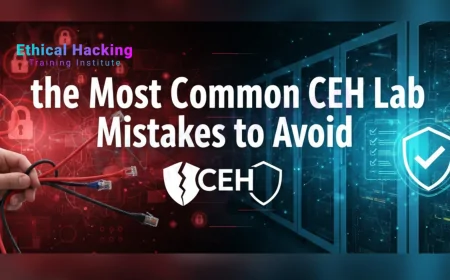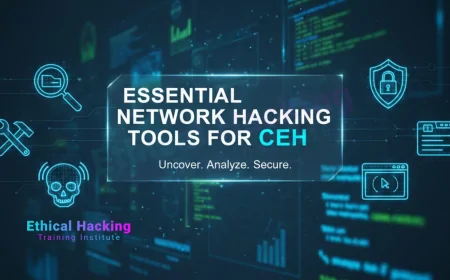Cyber Security and Ethical Hacking: A Complete Learning Path for Professionals | Start Your Cybersecurity Career: Ethical Hacking Learning Guide 2025
Explore a complete cyber security and ethical hacking learning path tailored for professionals. From fundamentals to top certifications like CEH and OSCP, this guide covers career roles, tools, trends, and 20 FAQs to help you build a successful career in cybersecurity in 2025 and beyond.
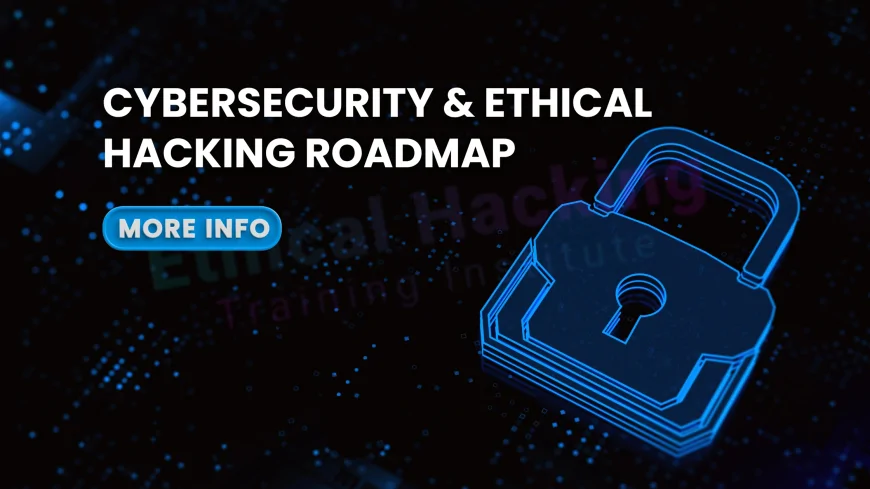
Table of Contents
- Introduction to Cyber Security and Ethical Hacking
- Why Cyber Security and Ethical Hacking Matter
- Career Pathways in Cyber Security
- Core Skills Required for Ethical Hackers
- Top Certifications in Cyber Security and Ethical Hacking
- Complete Learning Path for Professionals
- Popular Tools Every Ethical Hacker Must Know
- Real-World Applications and Case Studies
- Top Learning Resources and Platforms
- Latest Trends in Cyber Security (2025 and Beyond)
- FAQs
- Conclusion
Introduction to Cyber Security and Ethical Hacking
Cyber security is the practice of safeguarding systems, networks, and programs from digital threats. Ethical hacking, also known as penetration testing, involves legally breaking into computers and devices to test an organization's defenses. Together, these fields form a crucial pillar in defending digital ecosystems.
With the explosion of internet-connected devices, from IoT to mobile computing, the demand for skilled cybersecurity professionals and ethical hackers has soared. Professionals are now expected to know not just theoretical concepts, but hands-on security tools, tactics, and real-time cyber defense strategies.
Why Cyber Security and Ethical Hacking Matter
Cyber threats have evolved beyond viruses. We're now dealing with:
-
Ransomware attacks
-
Nation-state cyber espionage
-
Zero-day vulnerabilities
-
Supply chain attacks
-
Phishing and social engineering
Without proactive cybersecurity, even billion-dollar organizations face potential disaster.
Ethical Hacking: Your Frontline of Defense
Ethical hackers act as digital watchdogs—spotting vulnerabilities before the bad actors do. Their work saves companies millions in losses and protects sensitive consumer data.
Career Pathways in Cyber Security
Here’s how you can shape your career:
| Career Role | Description |
|---|---|
| Security Analyst | Monitors and investigates security incidents. |
| Penetration Tester (Ethical Hacker) | Simulates attacks to find vulnerabilities. |
| Security Engineer | Builds secure systems and networks. |
| SOC Analyst | Works in Security Operations Centers, handling real-time threats. |
| Threat Intelligence Analyst | Analyzes threat patterns and attacker behavior. |
| Security Architect | Designs the overall security structure for systems. |
Core Skills Required for Ethical Hackers
To become a competent ethical hacker, you must master:
-
Networking Fundamentals – TCP/IP, DNS, routing, firewalls.
-
Linux/Unix – Most hacking tools run on Linux.
-
Programming/Scripting – Python, Bash, JavaScript.
-
Web Technologies – HTML, HTTP, SQL, REST APIs.
-
Cryptography – Encryption standards, hashing.
-
Operating Systems – Deep understanding of Windows and Linux OS internals.
-
Tools – Kali Linux, Metasploit, Nmap, Burp Suite, Wireshark.
Top Certifications in Cyber Security and Ethical Hacking
These globally recognized certifications enhance your credibility:
| Certification | Issued By | Focus |
|---|---|---|
| CEH (Certified Ethical Hacker) | EC-Council | Offensive Security |
| CompTIA Security+ | CompTIA | Entry-level general security |
| OSCP (Offensive Security Certified Professional) | Offensive Security | focuses on hands-on penetration testing skills, while CISSP |
| CISSP (Certified Information Systems Security Professional) | ISC² | is designed for advanced enterprise-level cybersecurity professionals. |
| CISA/CISM | ISACA | Security auditing and management |
Complete Learning Path for Professionals
Here’s a strategic roadmap for becoming a cyber security expert:
1. Foundations (0–3 Months)
-
Learn networking concepts (TCP/IP, OSI).
-
Study Linux basics (Ubuntu, Kali).
-
Explore Python programming.
2. Beginner to Intermediate (3–6 Months)
-
Take CompTIA Security+.
-
Learn about firewalls, SIEM, encryption.
-
Practice on TryHackMe and Hack The Box.
3. Intermediate to Advanced (6–12 Months)
-
Enroll in CEH and OSCP training.
-
Learn advanced penetration testing.
-
Master tools like Metasploit, Burp Suite.
4. Specialization (1–2 Years)
-
Focus on red teaming, blue teaming, or cloud security.
-
Take CISSP, CISM, or AWS Security certifications.
-
Work on real-world projects and CTFs.
Popular Tools Every Ethical Hacker Must Know
| Tool | Purpose |
|---|---|
| Nmap | Network scanning and enumeration |
| Wireshark | Network packet analysis |
| Burp Suite | Web application testing |
| Metasploit | Exploit development and deployment |
| Nikto | Web server scanning |
| Aircrack-ng | Wireless network testing |
| John the Ripper | Password cracking |
| Hydra | Brute force attacks |
| Gobuster | Directory brute-forcing |
| OWASP ZAP | Open-source web app scanner |
Real-World Applications and Case Studies
-
Equifax Data Breach: Cost $700M due to unpatched Apache Struts.
-
Target Attack: Exploited a third-party HVAC system.
-
WannaCry Ransomware: Spread using SMB vulnerabilities in outdated Windows OS.
These scenarios stress the importance of staying ahead with vulnerability scans, applying updates promptly, and testing defenses through penetration testing.
Top Learning Resources and Platforms
| Platform | Best For |
|---|---|
| TryHackMe | Guided hacking labs |
| Hack The Box | Realistic CTF-style practice |
| Cybrary | Free and paid courses |
| INE | Advanced cyber labs |
| Webasha | Beginner to intermediate courses |
| EC-Council | Official CEH content |
| Offensive Security | OSCP and advanced certifications |
Latest Trends in Cyber Security (2025 and Beyond)
-
AI-Powered Attacks and Defenses
-
Zero Trust Architecture (ZTA)
-
Quantum Cryptography
-
Cloud Security Automation
-
Extended Detection and Response (XDR)
-
Cyber Security Mesh Architecture (CSMA)
Staying ahead of these trends is key for professionals in the field.
FAQs:
1. What is ethical hacking?
Ethical hacking is the authorized practice of bypassing system security to identify potential data breaches and threats in a network. Ethical hackers help strengthen organizations' defenses.
2. How is ethical hacking different from malicious hacking?
Ethical hacking is performed with permission to improve security, while malicious hacking is unauthorized and illegal, often intended to steal or destroy data.
3. What qualifications are needed to become an ethical hacker?
A strong foundation in networking, operating systems, and programming is essential. Certifications like CEH, OSCP, or Security+ are highly recommended.
4. How long does it take to learn ethical hacking?
It can take 6 months to 2 years to become proficient, depending on your background, time investment, and learning path.
5. Do I need a degree to work in cyber security?
While a degree can help, it’s not mandatory. Employers value practical skills, certifications, and hands-on experience more than formal education.
6. What programming languages are useful for ethical hacking?
Python, JavaScript, Bash, and sometimes C/C++ are commonly used in scripting, automation, and exploit development.
7. Which certification is best to start a cyber security career?
CompTIA Security+ is ideal for beginners. For hands-on hacking, CEH or OSCP are excellent next steps.
8. What is CEH certification?
The Certified Ethical Hacker (CEH) is a globally recognized certification by EC-Council that validates skills in penetration testing and ethical hacking.
9. What is OSCP certification?
Offensive Security Certified Professional (OSCP) is an advanced certification focusing on hands-on penetration testing skills and real-time exploitation.
10. How can I practice ethical hacking legally?
Use platforms like TryHackMe, Hack The Box, and CTF challenges. Always have permission before testing any real system.
11. What tools do ethical hackers use?
Popular tools include Nmap, Burp Suite, Metasploit, Wireshark, John the Ripper, Hydra, Nikto, and Aircrack-ng.
12. What are bug bounty programs?
Bug bounty programs pay ethical hackers to find and report security vulnerabilities in applications and systems.
13. Can ethical hackers work as freelancers?
Yes, many ethical hackers work independently, offering penetration testing, vulnerability assessments, and participating in bug bounty programs.
14. What are red teams and blue teams?
Red teams simulate attacks to test systems (offensive), while blue teams defend and respond to threats (defensive).
15. What is a penetration test?
A penetration test is a simulated cyberattack on a system to evaluate its security. It helps identify exploitable vulnerabilities.
16. Is Linux important for ethical hacking?
Absolutely. Most tools and environments used in ethical hacking are built for Linux systems like Kali Linux or Parrot OS.
17. What is the average salary of an ethical hacker?
In India, ethical hackers earn between ₹5–25 LPA. Globally, salaries range from $60,000 to $150,000 annually based on skills and location.
18. What is social engineering?
Social engineering is a tactic that manipulates individuals into revealing confidential information. Common examples include phishing and baiting.
19. What’s the future of cyber security?
Cyber security is shifting toward AI-based threat detection, Zero Trust models, quantum-safe encryption, and more sophisticated attack surfaces like IoT and cloud.
20. How do I stay updated with cyber security trends?
Follow blogs like Krebs on Security, attend DEFCON/Black Hat events, subscribe to cyber newsletters, and enroll in continuous learning platforms like TryHackMe and Cybrary.
Conclusion
Cyber security and ethical hacking aren't just job roles—they are missions to safeguard digital life. As the world shifts deeper into AI, IoT, and cloud technologies, the need for skilled professionals will only grow.
Following the learning path outlined above, arming yourself with certifications, practicing on real-world platforms, and staying updated with the latest tools and techniques can lead you to a rewarding and impactful career.
What's Your Reaction?
 Like
1
Like
1
 Dislike
0
Dislike
0
 Love
0
Love
0
 Funny
0
Funny
0
 Angry
0
Angry
0
 Sad
0
Sad
0
 Wow
0
Wow
0






